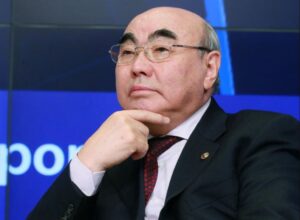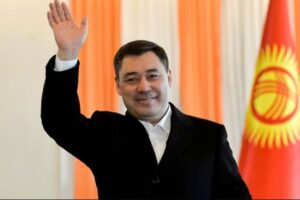Since gaining independence from the Soviet Union in 1991, Kyrgyzstan has had a number of presidents, each playing a pivotal role in shaping the nation’s political landscape. Below is a detailed list of the presidents of Kyrgyzstan, arranged in chronological order, along with the years they served.
| President | Years in Office |
|---|---|
| 1. Askar Akayev | 1990 - 2005 |
| 2. Kurmanbek Bakiyev | 2005 - 2010 |
| 3. Roza Otunbayeva | 2010 - 2011 |
| 4. Almazbek Atambayev | 2011 - 2017 |
| 5. Sooronbay Jeenbekov | 2017 - 2020 |
| 6. Sadyr Japarov | 2021 - Present |
READ ALSO: Presidents That Have Ruled Israel Till Date
First President: Askar Akayev

Askar Akayev was the first president of Kyrgyzstan, serving from 1990 until 2005. Originally a physicist, Akayev was unexpectedly chosen as the president of the Kyrgyz Soviet Socialist Republic in 1990. Following the dissolution of the Soviet Union in 1991, he became the first president of the independent Kyrgyzstan.
During his tenure, Akayev was credited with steering the country through its early years of independence. He implemented several market-oriented reforms and positioned Kyrgyzstan as a relatively open society compared to its Central Asian neighbors.
Notable Achievements:
- Led Kyrgyzstan to independence from the Soviet Union.
- Initiated economic reforms aimed at transitioning to a market economy.
- Encouraged democratic practices and media freedom in the early years of his presidency.
Downsides:
-
- His administration became increasingly authoritarian over time.
- Widespread corruption and nepotism led to growing public dissatisfaction.
- His presidency ended in 2005 following the Tulip Revolution, a popular uprising against his rule.
READ ALSO: Presidents That Have Ruled The United Arab Emirates Till Date
Current President: Sadyr Japarov

Sadyr Japarov is the current president of Kyrgyzstan, having assumed office in 2021 following a period of significant political upheaval. Japarov, a former politician and activist, came to power during the 2020 Kyrgyz protests, which led to the resignation of President Sooronbay Jeenbekov. Japarov’s rise to power was marked by his calls for constitutional reforms and efforts to address the country’s economic challenges.
Japarov has since focused on consolidating power through a controversial constitutional referendum that expanded presidential powers. His administration has faced criticism for perceived authoritarian tendencies, though he argues that strong leadership is necessary to stabilize the country.
Notable Achievements:
- Successfully pushed for constitutional reforms that have reshaped Kyrgyzstan’s political system.
- Emphasized economic recovery and development, particularly in the wake of the COVID-19 pandemic.
- Has taken steps to tackle corruption and improve governance.
Downsides:
- His administration has been criticized for undermining democratic institutions by expanding presidential powers.
- Concerns about political repression and the stifling of opposition voices.
- The long-term impact of his constitutional changes on Kyrgyzstan’s democracy remains uncertain.
READ ALSO: Presidents That Have Ruled Uzbekistan Till Date
The Current Vice President of Kyrgyzstan
Kyrgyzstan does not have a vice president. The political structure of the country is such that the president serves as the head of state, with the Prime Minister acting as the head of government.
This structure has seen various changes over the years, especially with recent constitutional reforms under President Sadyr Japarov. The absence of a vice president emphasizes the strong presidential system that has been further consolidated under Japarov’s leadership.
Notable Achievements of Kyrgyzstan’s Presidents
Over the years, each president of Kyrgyzstan has contributed uniquely to the country’s development:
- Askar Akayev: Led the country to independence, implemented initial market reforms, and promoted early democratic practices.
- Kurmanbek Bakiyev: His tenure saw significant economic growth, although marred by allegations of corruption and authoritarianism.
- Roza Otunbayeva: As the first female president, she provided stable leadership during a crucial transitional period and organized fair elections.
- Almazbek Atambayev: Strengthened state institutions and implemented anti-corruption measures, although his tenure was not without controversy.
- Sooronbay Jeenbekov: Focused on judicial reforms but struggled with political instability, eventually resigning in the face of mass protests.
- Sadyr Japarov: Promoted constitutional reforms and economic recovery, though his administration has faced criticism for centralizing power.
Challenges Faced by Kyrgyzstan’s Presidents
While each president has had notable achievements, they have also faced significant challenges:
- Askar Akayev: His presidency ended in a revolution due to growing dissatisfaction with corruption and authoritarianism.
- Kurmanbek Bakiyev: Despite economic growth, his administration was plagued by corruption and ultimately overthrown during a popular uprising.
- Roza Otunbayeva: Her brief tenure was marked by the challenge of stabilizing a country recovering from violent ethnic clashes.
- Almazbek Atambayev: Faced challenges in implementing anti-corruption measures and maintaining public trust.
- Sooronbay Jeenbekov: His resignation amidst political unrest highlighted the ongoing struggles with democratic governance in Kyrgyzstan.
- Sadyr Japarov: His presidency has been marked by controversy over constitutional changes and concerns about the future of democracy in Kyrgyzstan.
Conclusion
The presidency in Kyrgyzstan has been a position marked by both opportunity and challenge. From Askar Akayev’s leadership during the formative years of the nation to Sadyr Japarov’s current administration, the role of the president has been central to the country’s political evolution.
Each president has faced the complex task of balancing governance, economic development, and the preservation of democratic values, with varying degrees of success.
As Kyrgyzstan continues to navigate its path in the post-Soviet era, the role of the president will remain crucial in determining the direction of the country.
The ongoing challenges and the potential for further reforms will likely shape the future of Kyrgyzstan’s democracy and its place in the global community.
